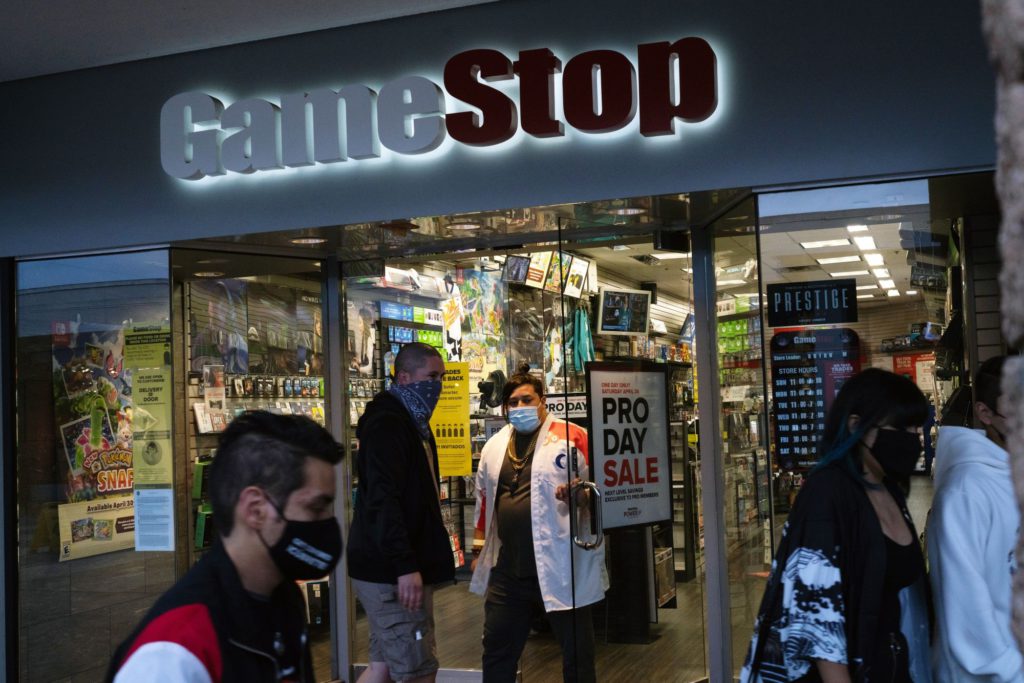(Bloomberg) — Earnings day hasn’t been kind to GameStop Corp. investors — and analysts, options trading and recent history suggest Wednesday evening’s won’t likely be any different.
Shares of the video-game retailer were up 1.2% in New York on Wednesday but they have tumbled 18% on average the day after earnings since June 2019 — they gained on such reports only twice since the start of 2018. Add on that the options market implies the stock will swing 15% by the end of Thursday’s session and it suggests it could be a choppy few days ahead for the company that helped set off the meme-stock trend.
The optimism of such retail investors — which fueled a meteoric rise in the stock price and has baffled professional analysts — has held steady ahead of potential updates on activist investor and Chairman Ryan Cohen’s long-awaited turnaround strategy. Cohen’s goal is to turn the struggling retailer into an e-commerce competitor to Amazon.com Inc., though not everyone is sold on the Chewy Inc. co-founder’s vision.
“The company remains enormously structurally challenged as the entire market moves rapidly to streaming/downloads,” said Vital Knowledge’s Adam Crisafulli. “The company’s stock price is completely divorced from fundamentals and has been for some time.”
That disconnect has been driven by what one analyst called “Reddit raiders” who rallied together to send the company’s shares soaring and delivered huge losses to short sellers who bet against it. The video-game retailer’s share price surged to an intraday peak of as much as $483 in January, up from less than $19 at the end of 2020, before gyrating over the past seven months. It closed at $199 on Tuesday.
Out-of-the-money call options expiring Friday, a favorite of retail investors, were the most actively traded derivative for the company on Tuesday, with some wagering on a potential surge in the share price this week. That stands out against the recent trend of investors hedging for GameStop’s shares to fall, with put option open interest outweighing call options by a ratio of two-to-one.
While its current stock price gives GameStop a $15.3 billion market capitalization, Wall Street analysts say it’s unwarranted given the company’s outlook. The stock has one analyst who rates it at a hold while two advise clients to sell the stock. The average 12-month price target of $88.33 implies shares should lose another 56% over the coming year.
Despite earnings that likely will mean little given GameStop is still up nearly 1,000% this year, it’s worth noting that Wall Street is looking for revenue of $1.12 billion. If the retailer can top estimates it would mark just the second time it has beat sales expectations since the start of 2019 and show that it capitalized on the launches of new game consoles from Sony Corp. and Microsoft Corp.
“GameStop is well-positioned to be a primary beneficiary of the new console launches,” wrote Wedbush analyst Michael Pachter, who rates the stock an underperform. While he anticipates second-quarter sales will top expectations, he doesn’t expect details on the “long-awaited transformation strategy.”
The stock’s rally this year dealt short sellers some $6.41 billion in losses through Friday’s close, according to S3 Partners. Short interest for the retailer has inched lower to near 11%, S3 Partners’ data show, a fraction of the more than 140% level seen back in January before retail investors stampeded in.
Cohen, who became GameStop’s chairman in June, has shaken up the company’s management since taking a stake in the retailer last year. He appointed a pair of Amazon executives to take the helm, and Wednesday’s earnings call will be the first one led by now Chief Executive Officer Matt Furlong.
GameStop is among the market’s most closely watched meme stocks even as Wall Street pros have taken the reins from amateurs to drive recent swings. The stock remains one of the year’s best performers in a Bloomberg basket of companies that Robinhood Markets restricted trading of during the meme-stock craze early this year. That equally weighted index is up more than 75% in 2021.
(Updates share prices throughout.)
More stories like this are available on bloomberg.com
©2021 Bloomberg L.P.











